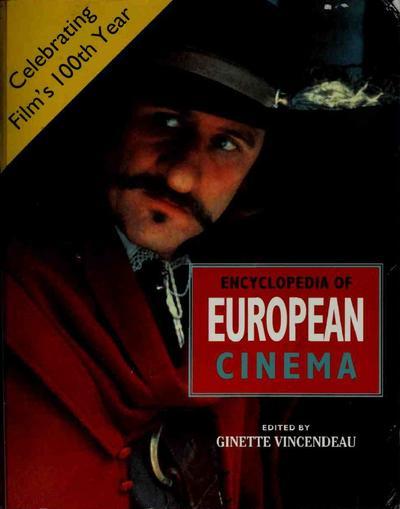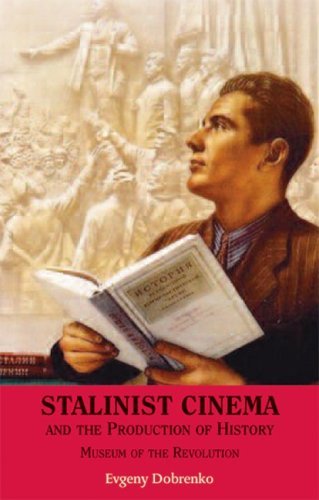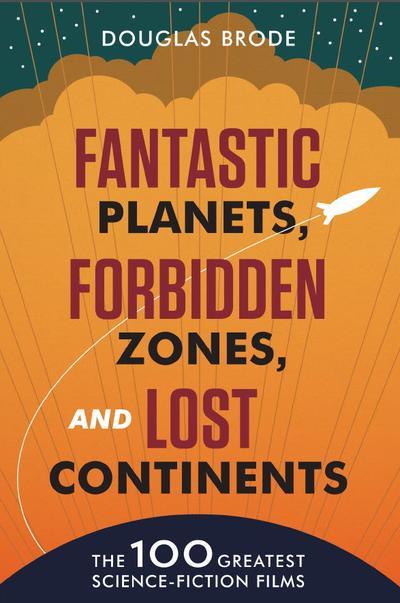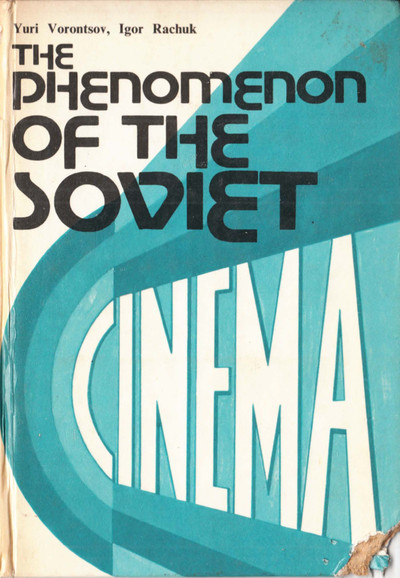On December 28, 1895, the Lumiere brothers demonstrated their cinematograph to 33 people in Paris. Despite Louis Lumiere’s notorious declaration that “the cinema is an invention without a future, ” the occasion marks the birth of the movies. Written to coincide with the 100th anniversary of this seminal event, “Encyclopedia of European Cinema” is a celebration of the scope and variety of film in all European countries. Compiled under the auspices of the prestigious British Film Institute, this uses the expertise of over 30 international authorities on the subject.Read More »
Books
-
Ginette Vincendeau – Encyclopedia of European Cinema (1995)
1991-2000BooksGinette VincendeauUnited Kingdom -
Evgeny Dobrenko – Stalinist Cinema and the Production of History: Museum of the Revolution (2008)
2001-2010BooksEvgeny DobrenkoQuote:
‘This is essential reading for all those interested in Soviet film. Dobrenko with
his fresh approach and non-standard mix of examples confounds many of the
clichés about the subject.’– Professor Katerina Clark, Yale UniversityRead More »
-
Howard Hughes – Stagecoach to Tombstone: The Filmgoer’s Guide to Great Westerns (2008)
2001-2010BooksHoward HughesUSABritish author Howard Hughes charts the development of the modern Western movie in this insightful, informative volume published in 2008 by Tauris & Company. By examining 27 movies he views as key, Hughes shows the evolving nature of the genre. Western fans are in for an interesting ride since the films range from classics like ‘Stagecoach’ to B-oaters such as ‘Ride Lonesome’ to misfires like ‘One-Eyed Jacks.’ Read More »
-
Douglas Brode – Fantastic Planets, Forbidden Zones and Lost Continents (2015)
2011-2020BooksDouglas BrodeUSAWhether you judge by box office receipts, industry awards, or critical accolades, science fiction films are the most popular movies now being produced and distributed around the world. Nor is this phenomenon new. Sci-fi filmmakers and audiences have been exploring fantastic planets, forbidden zones, and lost continents ever since George Méliès’ 1902 film A Trip to the Moon. In this highly entertaining and knowledgeable book, film historian and pop culture expert Douglas Brode picks the one hundred greatest sci-fi films of all time. Brode’s list ranges from today’s blockbusters to forgotten gems, with surprises for even the most informed fans and scholars. He presents the movies in chronological order, which effectively makes this book a concise history of the sci-fi film genre. A striking (and in many cases rare) photograph accompanies each entry, for which Brode provides a numerical rating, key credits and cast members, brief plot summary, background on the film’s creation, elements of the moviemaking process, analysis of the major theme(s), and trivia. He also includes fun outtakes, including his top ten lists of Fifties sci-fi movies, cult sci-fi, least necessary movie remakes, and “so bad they’re great” classics—as well as the ten worst sci-fi movies (“those highly ambitious films that promised much and delivered nil”). So climb aboard spaceship Brode and journey to strange new worlds from Metropolis (1927) to Guardians of the Galaxy (2014).Read More »
-
Jon Tuska – The Detective In Hollywood (1978)
1971-1980BooksJon TuskaUSAThe Detective In Hollywood: The Movie Careers Of The Great Fictional Private Eyes And Their Creators is a fascinating study of classic Hollywood detective movies (and some of the nearly forgotten series like the Crime Doctor and Mr. Wong), based on interviews with some of the men and women involved in creating them (authors, directors, screenwriters, and actors and actresses) like Billy Wilder, Alfred Hitchcock, Leigh Brackett, Barbara Hale, Robert Montgomery, and many others.Read More »
-
Farhang Erfani – Iranian Cinema and Philosophy: Shooting Truth (2012)
2011-2020BooksFarhang ErfaniUSAIn film studies, Iranian films are kept at a distance, as ‘other,’ different, and exotic. In reponse, this book takes these films as philosophically relevant and innovative. Each chapter of this book is devoted to analyzing a single film, and each chapter focuses on one philosopher and one particular aesthetic question.
‘A fascinating piece of work which brings the insights of Continental philosophy to bear on Iranian cinema and perhaps more importantly brings Iranian cinema to bear on those insights.’ – Simon Critchley, Hans Jonas Professor of Philosophy, New School for Social ResearchRead More »
-
Barry Forshaw – Sex and Film: The Erotic in British, American and World Cinema (2015)
2011-2020Barry ForshawBooksUnited KingdomSex and Film: The Erotic in British, American and World Cinema is a frank, comprehensive and insightful analysis of the cinema’s long love affair with the erotic – and how society is reflected through the many and bitter censorship battles that have accompanied all attempts by filmmakers to broaden the limits of what is acceptable. Barry Forshaw’s lively and scholarly study moves from the sexual abandon of the silent era and the 1930s through the enforced innocence resulting from the restrictive Hays Code (and the ingenious attempts by filmmakers to circumvent censorship) and the demolition of taboos by arthouse directors such as Ingmar Bergman in the 1950s and 1960s. The book highlights all the key moments in this incendiary area, including the shocking exploitation and pornographic movies of the 1970s, while a discussion of the graphic and explicit imagery of today’s mainstream cinema takes the book up to the present – and beyond.Read More »
-
Yuri Vorontsov; Igor Rachuk – The phenomenon of the Soviet cinema (1980)
1971-1980BooksIgor RachukUSSRYuri VorontsovAuthor: Yuri Vorontsov; Igor Rachuk
Publisher: Moskva : Progress Publishers, 1980
Edition/Format: Print book : EnglishRelated Subjects:
Motion pictures — Soviet Union — History.
Cinéma — URSS — Histoire.
Motion pictures.
Soviet Union.Read More » -
Sam Stourdzé – Fellini (2014)
2011-2020BooksNetherlandsSam StourdzéThe career of Federico Fellini lasted for forty years and made him perhaps the most illustrious of all the filmmakers to have come out of Italy. Those forty years saw the appearance of titles that have carved out a permanent niche in the memory of generations of film lovers. Fellini, a richly illustrated book written and edited by Sam Stourdzé, Director of the Musée de l’Elysée in Lausanne (Switzerland), taps into the sources of his fertile imagination and brings the vital power of his work into the limelight providing insight into the obsessions and motivations of the man behind La Strada, La Dolce Vita and 8¿.Read More »








